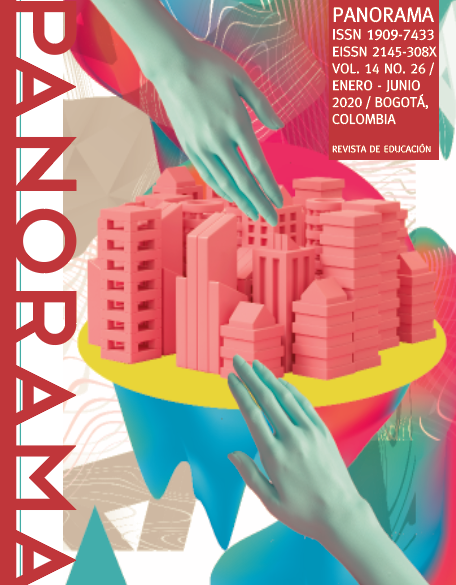Resumen
El objetivo de esta reflexión es el de construir elementos pertinentes sobre la evaluación de la apropiación del conocimiento por parte de los estudiantes de educación virtual del Politécnico Grancolombiano en nuestro ejercicio tutorial, por medio de una breve revisión de literatura. La metodología, de índole cualitativa, implicó la recolección de datos de artículos en la base de datos Scopus y la identificación de criterios relevantes para la construcción de los conceptos por parte de los tutores. El resultado arrojó una constante en las temáticas, donde pudo identificarse los diferentes componentes a tener en cuenta para elaborar la rúbrica, toda vez que pone en evidencia algunos elementos que pueden aplicarse dentro de la función tutorial, en pro de ayudar a los estudiantes a construir conocimiento y evaluar los niveles de apropiaciónReferencias
Bowe, C., & Armstrong, E. (2017). Assessment for Systems Learning: A Holistic Assessment Framework to Support Decision Making Across the Medical Education Continuum. Academic Medicine, 92(5), 585–592. https://doi.org/10.1097/ACM.0000000000001321
Butz, A., & Branchaw, J. (2020). Entering Research Learning Assessment (ERLA): Validity Evidence for an Instrument to Measure Undergraduate and Graduate Research Trainee Development. CBE Life Sciences Education, 19(2), ar18. https://doi.org/10.1187/cbe.19-07-0146
Chang, S.-C., Hsu, T.-C., & Jong, M. (2020). Integration of the peer assessment approach with a virtual reality design system for learning earth science. Computers and Education, 146. https://doi.org/10.1016/j.compedu.2019.103758
Chen, B., & Zhang, Y. (2018). A rubric-based technology-enhanced assessment approach to improve students’ meta-cognitive awareness and learning achievement. In L. J., N. S., J. Q., & Z. H. (Eds.), 6th International Conference of Educational Innovation Through Technology, EITT 2017 (Vol. 2018-March, 111–115). https://doi.org/10.1109/EITT.2017.34
Colaco, H., Hughes, K., Pearse, E., Arnander, M., & Tennent, D. (2017). Construct Validity, Assessment of the Learning Curve, and Experience of Using a Low-Cost Arthroscopic Surgical Simulator. Journal of Surgical Education, 74(1), 47–54. https://doi.org/10.1016/j.jsurg.2016.07.006
Cowie, N. (2019). The use of rubrics for the assessment of digital products in language learning. 32nd Annual Conference of the Australasian Society for Computers in Learning and Tertiary Education, ASCILITE 2015, 626–628. Recuperado de: https://www.scopus.com/inward/record.uri?eid=2-s2.0-85071726889&partnerID=40&md5=b98008c666cc0e5e9a7e2c18a9d32bc8
Daza-Orozco, CE. (Ed.). (2019) Iniciación cientifíca: conceptualización, metodologías y buenas prácticas. Bogotá, Colombia. Institución Universitaria Politécnico Grancolombiano.
Dennis, V., Craft, M., Bratzler, D., Yozzo, M., Bender, D., Barbee, C., … Robinson, M. (2019). Evaluation of student perceptions with 2 interprofessional assessment tools—the Collaborative Healthcare Interdisciplinary Relationship Planning instrument and the Interprofessional Attitudes Scale—following didactic and clinical learning experiences in t. Journal of Educational Evaluation for Health Professions, 16. https://doi.org/10.3352/JEEHP.2019.16.35
Dutton, P., Bickerstaff, H., Rymer, J., Webb, M., Ballinger-Mills, D., Greenough, A., & Reynolds, P. (2017). Investigation of Formative Assessment of Learning (INFORMAL): The Performance Indicator Tool (PIT). Technology, Knowledge and Learning, 22(2), 161–171. https://doi.org/10.1007/s10758-017-9307-2
ElAtia, S., & David, E. (2019). Using learning analytics within an e-assessment platform for a transformative evaluation in bilingual contexts. In U. J., L. H., & Z. S. (Eds.), 11th International Conference on Computer Supported Education, CSEDU 2019 (Vol. 1, 674–680). Recuperado de: https://www.scopus.com/inward/record.uri?eid=2-s2.0-85067097069&partnerID=40&md5=9c82c01a28fb5a2dcdf03ab52aeb8d20
Farrell, C. (2020). Do international marketing simulations provide an authentic assessment of learning? A student perspective. International Journal of Management Education, 18(1). https://doi.org/10.1016/j.ijme.2020.100362
Fete, M., Haight, R., Clapp, P., & McCollum, M. (2017). Peer evaluation instrument development, administration, and assessment in a team-based learning curriculum. American Journal of Pharmaceutical Education, 81(4). https://doi.org/10.5688/ajpe81468
Hasty, B., Lau, J., Tekian, A., Miller, S., Shipper, E., Bereknyei Merrell, S., … Park, Y. (2020). Validity Evidence for a Knowledge Assessment Tool for a Mastery Learning Scrub Training Curriculum. Academic Medicine : Journal of the Association of American Medical Colleges, 95(1), 129–135. https://doi.org/10.1097/ACM.0000000000003007
Hatala, R., Gutman, J., Lineberry, M., Triola, M., & Pusic, M. (2019). How well is each learner learning? Validity investigation of a learning curve-based assessment approach for ECG interpretation. Advances in Health Sciences Education, 24(1), 45–63. https://doi.org/10.1007/s10459-018-9846-x
Matus, J., Mickan, S., & Noble, C. (2020). Developing occupational therapists’ capabilities for decision-making capacity assessments: how does a support role facilitate workplace learning? Perspectives on Medical Education, 9(2), 74–82. https://doi.org/10.1007/s40037-020-00569-1
Naiksatam, A., Khanchandani, K., & Chachra, S. (2018). Effective online assessment and evaluation though online laboratory work submission for technology enhanced learning. In K. V., M. S., Kinshuk, & I. S. (Eds.), 9th International Conference on Technology for Education, T4E 2018 (212–213). https://doi.org/10.1109/T4E.2018.00056
Nayak, A., Umadevi, F., & Preeti, T. (2017). Rubrics based continuous assessment for effective learning of digital electronics laboratory course. In R. M., G. D., & K. V. (Eds.), 4th IEEE International Conference on MOOCs, Innovation and Technology in Education, MITE 2016 (290–295). https://doi.org/10.1109/MITE.2016.15
Parthasarathy, P., Apampa, B., & Manfrin, A. (2019). Perceptions of team-based learning using the Team-Based Learning Student Assessment Instrument: An exploratory analysis amongst pharmacy and biomedical students in the United Kingdom. Journal of Educational Evaluation for Health Professions, 16. https://doi.org/10.3352/jeehp.2019.16.23
Pujals, A., & Lasagabaster, D. (2019). The role of assessment and corrective feedback on autonomy and motivation in the learning of Spanish as an L3. Revista Española de Lingüística Aplicada, 32(2), 455–485. https://doi.org/10.1075/resla.17050.gar
Rogne, W., & Gamlem, S. (2019). Pupils’ Information Processing and Its Implications for Learning and Assessment: A Think-Aloud Study. Scandinavian Journal of Educational Research, 63(4), 520–533. https://doi.org/10.1080/00313831.2017.1402369
Siddiq, F., Gochyyev, P., & Wilson, M. (2017). Learning in Digital Networks – ICT literacy: A novel assessment of students’ 21st century skills. Computers and Education, 109, 11–37. https://doi.org/10.1016/j.compedu.2017.01.014
Tarimo, W., & Hickey, T. (2017). Groupwork: Learning during collaborative assessment activities. In Smith, B. M., M. E., & L. K. (Eds.), 12th International Conference on Computer Supported Collaborative Learning - Making a Difference: Prioritizing Equity and Access in CSCL, CSCL 2017 (Vol. 1, 463–470). Recuperado de: https://www.scopus.com/inward/record.uri?eid=2-s2.0-85073331026&partnerID=40&md5=63948aa92cd3bf7503af947f8348bff5
Worlitz, J., Branke, M., Troike, M., Hettling, L., & Woll, R. (2019). The Contribution of Learning, Teaching and Assessment Activities to the Development of 21st Century STEM Competencies. In L. M., N. S., W. G., S. J., R. M., L. L., & V. N. (Eds.), 2018 IEEE International Conference on Teaching, Assessment, and Learning for Engineering, TALE 2018 (316–321). https://doi.org/10.1109/TALE.2018.8615320

Esta obra está bajo una licencia internacional Creative Commons Atribución-NoComercial-SinDerivadas 4.0.
Derechos de autor 2020 Revista Panorama





